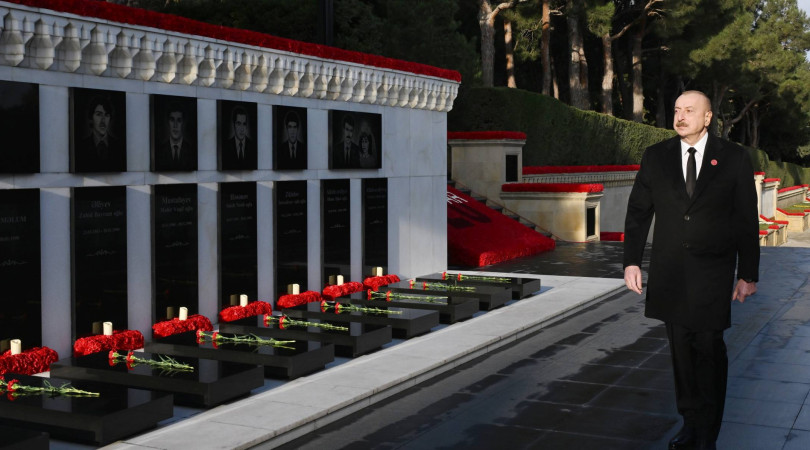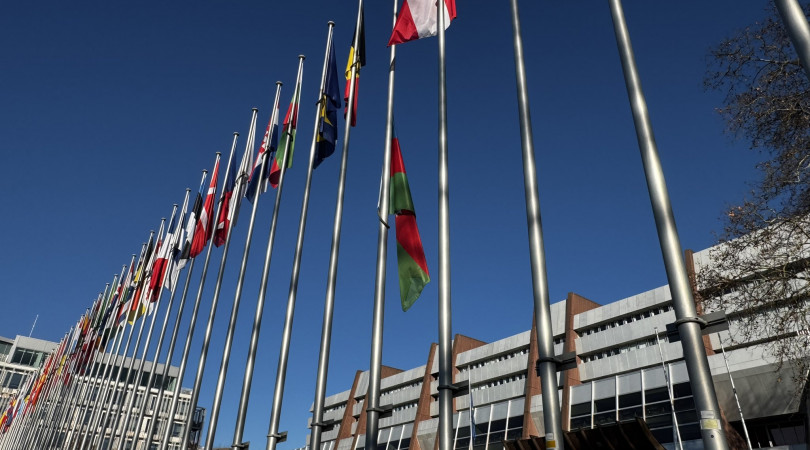Azerbaijan celebrating 99th anniversary of Azerbaijan Democratic Republic
99 years have passed since the Azerbaijan Democratic Republic – the first democratic republic – was established in the East.
The Azerbaijan Democratic Republic was declared on May 28, 1918 in Tbilisi by the Azerbaijan National Council headed by Mahammad Amin Rasulzade.
The Declaration of Independence adopted by the National Council of Azerbaijan reads as follows:
- From no on, the people of Azerbaijan are the bearers of sovereign rights, and Azerbaijan, which is stretching across the south-eastern Caucasus, is a fully independent state;
- The form of government of the independent Azerbaijan is Democratic Republic;
- The Azerbaijan Democratic Republic seeks to establish friendly relations with other nations particularly with neighboring nations and states;
- The Azerbaijan Democratic Republic grants its citizens equal political and civil rights regardless of their national identities, faiths, classes and races.
- The Azerbaijan Democratic Republic provides wide opportunities for the free development of all nations living in its territory.
The National Council elected by the people and the Temporary Government, which is responsible before the National Council, will lead Azerbaijan until the Assembly of Founders is established.
As Rasulzade was holding negotiations on Azerbaijan’s independence with the Ottoman Empire in Batumi, deputy chairman of Azerbaijan National Council Hasan bey Agayev chaired the meeting, where the Declaration of Independence was announced. Mustafa Mahmudov was secretary at the meeting. Fatali Khan Khoyski, Khalil bey Khasmammadov, Nasib bey Yusifbeyli, Mirhidayet Seyidov, Heybetgulu Mammadbeyov, Nariman bey Narimanbeyli (not Bolshevik Nariman Narimanov - editor), Mehdi bey Hajinski, Alasgar bey Mahmudbeyov, Aslan bey Gardashov, Sultanmajid Ganizade, Akbar aga Sheikhulislamov, Mehdi bey Hajibabbabeyov, Mammad Yusif Jafarov, Khudadat bey Melik-Aslanov, Rahim bey Vekilov, Hamid bey Shahtakhtinski, Firudin bey Kocharli, Jemo bey Hajinski, Shefi bey Rustambayov, Khosrov Pasha bey Sultanov, Jefer Akhundov, Mahammad Maharramov, Javad Melik-Yeganov and Haji Molla Salim Akhundzade attended the meeting.
The first temporary government of Azerbaijan Democratic Republic under the leadership of Fatali Khan Khoyski was confirmed at that meeting of Azerbaijan National Council. The composition of the first government was as follows:
Fatali Khan Khoyski – chairman of the Council of Ministers and Interior Minister
Khosrov Pasha bey Sultanov – Defense Minister
Mammadhasan Hajinski – Foreign Ministers
Nasib bey Yusifbeyli – Minister of Finance and Enlightenment
Khalil bey Khasmammadov – Justice Minister
Mammad Yusif Jafarov – Minister of Trade and Industry
Akbar aga Sheikhulislamov – Minister of Agriculture and Labor
Khudadat bey Melik-Aslanov – Minister of Roads and Post-Telegraph
Jamo bey Hajinski – State inspector
Azerbaijani government was temporarily based in Gandja, as Baku was under Bolshevik-Dashnak control headed by Stepan Shaumyan. On September 15, 1918 after the heavy battles Azerbaijani National Army and Caucasian Islamic Army led by Nuru Pasha liberated Baku from Bolshevik, dashnak and English military units and independent Azerbaijani Government moved to Baku.
Azerbaijani Parliament was solemnly inaugurated in Haji Zeynalabdin Tagiyev’s school for girls (now the building of Manuscripts Institute named after Fuzuli">Fuzuli) at 13.00 on December 7, 1918. Chairman of Azerbaijan National Council Rasulzadeh made a congratulatory speech.
Alimardan bey Topchubashov was elected chairman of the parliament, Hasan bey Agayev first deputy chairman of the parliament. Topchubashov was attending the Paris Peace Conference and therefore Hasan bey agayev chaired the parliament. At the first meeting of the parliament Fatali Khan Khoyski’s government resigned and decision was made to form a new government. Fatali Khan Khoyski led the government again.
During the Azerbaijan Democratic Republic, the parliament held 155 meetings. 10 meetings were held by the Azerbaijan National Council (May 27-November 19, 1918) and 145 – by the parliament of Azerbaijan (December 7, 1918 – April 27, 1920).
More than 270 draft laws were discussed by the parliament and 230 of them were adopted. Members of the parliament represented in 11 factions and groups participated in the elaboration, discussion and approval of the legislation. 11 commissions were working at the parliament.
Azerbaijan Democratic Republic reached great achievements in the short period of its history. It was the first republic given voting right to the women and securing the equality between men and women. A great work has been done in the spheres of national army building, issuing national currency, establishing national bank, democratization, free elections, international relations and recognition of the independence of Azerbaijan by the international community, securing the territorial integrity of Azerbaijan, conducting economic reforms and other fields. Unfortunately 23-month Azerbaijan Democratic Republic was overthrown by the bolsheviks on April 28, 1920.
The independence of Azerbaijan Democratic Republic was officially recognized first by the Ottoman Empire on June 4, 1918.
Now, the founding day of the Azerbaijan Democratic Republic is celebrated as the National Holiday of Azerbaijan- the Republic Day and is non-working day in the country.
By order of President Ilham Aliyev, the monument was erected in honor of ADR in the center of Baku. At the same time, by order of the Head of State, the anniversaries of founders of ADR Mamed Emin Rasulzade, Alimardanbey Topchubashov, Fatali Khan Khoysky memorialized and marked at the state level.
President of Azerbaijan holds an annual reception dedicated to the Republic Day.
Azerbaijan’s diplomatic mission and Diaspora organizations abroad, as well as all the institutions in the country hold events to mark 28 May – the Republic Day.


















